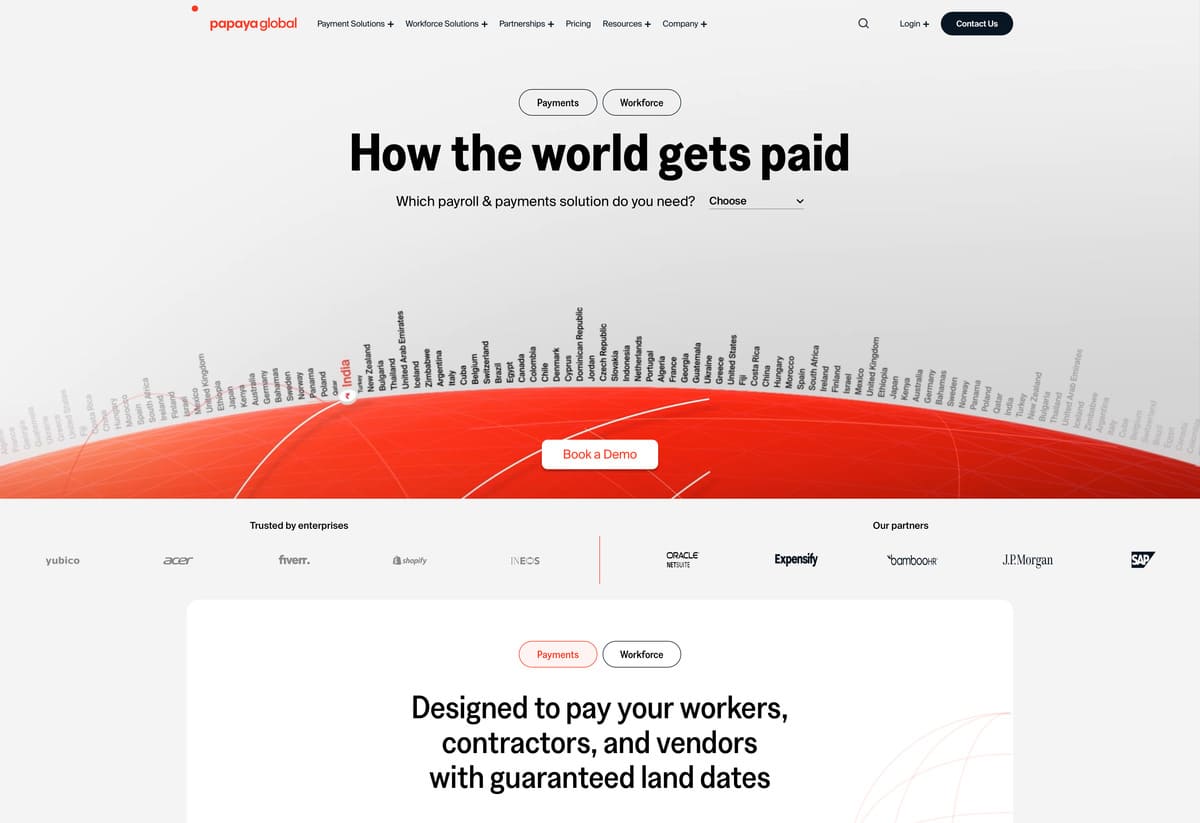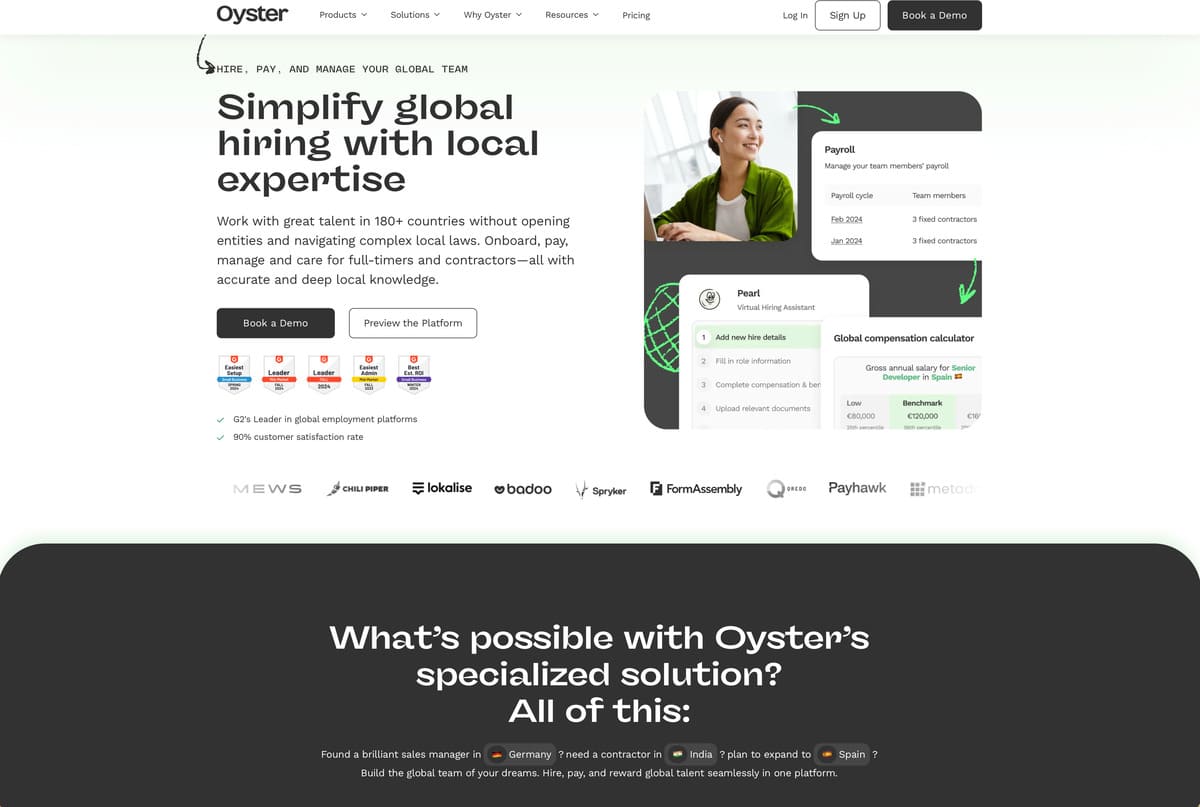Both Papaya Global and Oyster are prominent platforms offering global employment solutions, including Employer of Record (EOR) services, international payroll, and compliance management. Both cater to businesses seeking to expand their workforce internationally without establishing local entities. Here’s a comparative analysis of Papaya Global vs Oyster to help you determine which platform aligns best with your business needs.
Papaya Global vs Oyster comparison
| Feature | Papaya Global | Oyster |
|---|---|---|
| Employer of Record (EOR) | Provides EOR services in over 160 countries, enabling companies to hire full-time employees internationally without setting up legal entities. | Offers EOR services in more than 130 countries, acting as the legal employer on behalf of clients to ensure compliance with local employment laws. |
| Contractor Management | Supports the management of international contractors, including contract generation, onboarding, and payments in multiple currencies. | Provides contractor hiring and payroll services in over 180 countries, offering extensive coverage for managing international contractors. |
| Global Payroll | Manages payroll for both employees and contractors globally, supporting payments in multiple currencies with flexible payment methods. | Offers payroll support in more than 180 countries, processing payments in 120 local currencies, facilitating seamless international transactions. |
| Compliance Management | Ensures adherence to local labor laws with automated compliance checks, tax filings, and a network of in-country partners to navigate complex regulations. | Provides compliance solutions, including intellectual property protection, locally compliant contracts, and access to in-country benefits, ensuring adherence to local employment laws. |
| Benefits Administration | Offers comprehensive, locally tailored benefits, including healthcare, pensions, and other perks, often customized for specific countries. | Provides access to localized employee benefits as a paid add-on, allowing businesses to offer region-specific perks to their international workforce. |
| Onboarding and Offboarding | Features a user-friendly platform allowing quick onboarding of employees and contractors, ensuring compliance with regional laws. | Facilitates efficient onboarding processes with automated hiring and employee management features, streamlining the integration of international team members. |
| Integrations | Integrates with various HR and payroll systems; specific integration capabilities may vary. | Offers integration capabilities; specific tools supported may vary. |
| Support Model | Provides customer support via chat, email, and a dedicated point of contact, ensuring compliance and efficient HR management. | Offers support through chatbot, email, a dedicated client success manager, and help tickets raised through the Oyster portal, providing assistance tailored to client needs. |


Pricing comparison
Papaya Global pricing
- EOR Services: Starts at $599 per employee per month.
- Contractor Plan: Starts at $30 per contractor per month.
- Setup Fees: Charges fees for new client onboarding and system setup.
Oyster pricing
- EOR Services: Starts at $599 per employee per month, with an annual plan option at $499 per employee per month.
- Contractor Plan: $29 per contractor per month.
- Setup Fees: Does not charge setup and client onboarding fees but requires a refundable security deposit for new clients.
Strengths and weaknesses
Papaya Global
Strengths:
- Transparent pricing with a wide range of product offerings, including EOR, full-service payroll, data insights, and global benefits.
- International payroll, contractor management, and EOR services covering more than 160 countries.
- Fast global payments, with salary payouts ranging from immediate to within 72 hours.
Weaknesses:
- Uses a network of local partners to handle local HR processes, as it doesn’t own local entities in the countries it services.
- Charges fees for new client onboarding and system setup, which can increase initial costs.
Oyster
Strengths:
- Extensive contractor hiring and payroll services, covering more than 180 countries.
- Offers discounts for eligible nonprofits and B-corp businesses, including free refugee hiring for up to 10 workers.
- Transparent pricing for EOR services, with no additional setup fees, which is ideal for small businesses and startups.
- Strong emphasis on ethical employment practices, offering services like free hiring for refugee workers and support for socially conscious businesses.
Weaknesses:
- Limited support for complex global payroll analytics and reporting compared to Papaya Global.
- Fewer integrations with third-party HR and finance platforms, which could limit automation for larger organisations.
Suitability by business size
| Business size | Papaya Global | Oyster |
|---|---|---|
| Small businesses | Offers cost-effective contractor management but may incur higher upfront setup fees. | Ideal for cost-conscious startups with affordable contractor plans and transparent pricing. |
| Medium businesses | Great for businesses needing global payroll and detailed workforce insights. | Suitable for medium-sized businesses focusing on ethical employment and simple workflows. |
| Large enterprises | Best for organisations requiring comprehensive global payroll, analytics, and compliance tools. | Suitable for large companies prioritising compliance, localised benefits, and affordability. |
Key differentiators
Papaya Global USPs
- Advanced workforce analytics and reporting tools, making it ideal for data-driven organisations.
- Comprehensive payroll and compliance coverage for 160+ countries.
- Fast payment processing, typically within 72 hours.
Oyster USPs
- Transparent, affordable pricing with no onboarding fees, appealing to startups and small businesses.
- Strong focus on ethical employment practices and localised benefits.
- Discounts for non-profits and B-Corp organisations, with unique refugee hiring support.
Verdict
- Papaya Global is ideal for businesses that prioritise advanced payroll analytics, rapid payment processing, and comprehensive compliance solutions.
- Oyster is a cost-effective solution for startups and small businesses, with transparent pricing, ethical hiring practices, and accessible EOR services.
Choosing between the two depends on your business priorities: Papaya Global for robust analytics and payroll management or Oyster for affordability and streamlined global hiring.
FAQ – Papaya Global vs Oyster
Papaya Global offers automated compliance checks, tax filings, and in-depth regulatory support through its network of local partners. Oyster focuses on locally compliant contracts, intellectual property protection, and ethical employment, making it more accessible for businesses with straightforward compliance needs.
Both platforms provide international contractor management. Papaya Global starts at $30 per contractor/month, while Oyster’s plan is more affordable at $29 per contractor/month, with coverage for 180+ countries.
Both platforms start their EOR pricing at $599 per employee/month, but Oyster offers an annual plan at a discounted rate of $499 per employee/month. Papaya Global charges setup fees, whereas Oyster does not, making Oyster more cost-effective initially.
Yes, both platforms provide benefits administration. Papaya Global offers fully customised, localised benefits, while Oyster offers tailored benefits as an optional add-on, focusing on affordability and accessibility.
Oyster is better suited for small businesses and startups due to its transparent pricing, lack of setup fees, and ethical employment focus. Papaya Global may be more suitable for companies requiring advanced payroll analytics and compliance tools.
Papaya Global ensures salary payouts within 72 hours, offering faster processing times than many competitors. Oyster also supports timely payments but may vary depending on the country and payment method.
Papaya Global stands out with advanced reporting and workforce analytics, making it ideal for companies that require in-depth payroll and compliance data. Oyster offers basic reporting features but is more focused on streamlined, user-friendly operations.



